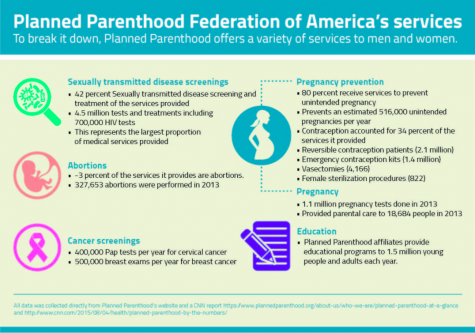The Fate of Roe v. Wade
On October 26, 2020, Amy Coney Barrett was confirmed to the Supreme Court following the death of beloved justice Ruth Bader Ginsburg. Her addition to the court flipped it to a Republican majority, concerning many Democrats. Not only did then-President Trump bypass previous statements made by Republican politicians that he would wait (until his supposed re-election) to confirm a justice—especially after Obama was blocked from confirming a justice with even more time until his re-inauguration—but he chose Barrett, an extremely religious pro-life advocate. It even seems as if, since Trump’s recent failure to be re-elected, that even more turmoil is being stirred up around women’s reproductive rights. Pro-choice advocates are now worried for the future of Roe v. Wade and women’s reproductive rights, and based on Barrett’s history and past statements, they are easily justified in this concern. The question is: is Roe v. Wade in danger only in name or is it actually possible that it may be overturned?
While Supreme Court justices are supposedly non-partisan and are not supposed to let their personal preferences and beliefs affect their court judgments, it is undisputed that this is not always the case. Political parties are constantly worried over who holds the court majority not just as a show of power, but because the court will most likely vote in favor of party lines. Ruth Bader Ginsberg was a women’s rights defender and this much was made clear through her verdicts, but it’s an ideology that is not always shared with conservatives. Now, with Barrett tipping the judicial scales, it is probable that more liberal cases will now be shot down.
My reasoning for the probability of Roe v. Wade being overturned is not just because of her religious background, pro-life ideology and highly conservative standing; it’s the subtle tones and ideas that can be observed through her statements. We can start with the fact that Barrett has claimed she wants to take a more originalist approach to judging. Originalism is the idea that the Constitution should be interpreted and understood as it would have at the time of its drafting rather than at the time of the court case. This brings up a very interesting clashing of ideas because, upon further research, one can learn that during colonial times, abortion was actually commonplace and can be traced via medical records. It was not until the 1800s when abortion became something to chastise and the 1860s when it was officially declared illegal. This means that if Barrett were to stick to true originalism, then she would actually be a proponent of legal abortions. Despite this, many people still believe that abortion has always been illegal and a sin, and it may not be too far of a reach to say that this may be what Barrett believes, considering how she could not even list all of the rights of the First Amendment. She may still believe that abortion is a sin under the founding fathers, though this was most likely not the case.
Barrett will have to pick through what parts of originalism she actually wants to follow or decide to claim that abortion is wrong under originalism. Society and politics have evolved so much since the Constitution’s drafting, and we should no longer expect that it can be applied effectively or accurately to everything in the current modern world. Even if Barrett’s take on originalism and its correlation to her opinion on abortion are at odds with each other, it is still safe to say that the words of a few men should not determine the fate of our country hundreds of years later.
Republicans have been known for avoiding talks about abortion due to the nature of the topic being so split among that entire party. However, Barrett recently made some concrete comments pertaining to the permanence of Roe v. Wade. She claimed that she believes the case does not qualify as super-precedent, meaning that the case is not one that is absolute or can never be overturned. Her main argument was that while Brown v. Board is super-precedent due to its standing as a case no longer debated and aggressively opposed, Roe v. Wade is still a very debatable case in which many people are not supporters of the 1973 decision. While she did not openly state that she would be actively pursuing an overturn of the case, these statements allude to the fact that she is open and willing to the idea—a possibility that scares many women’s advocates with how many negative repercussions would come with the case being overturned.
Even other states are recognizing the likelihood of the case being overturned as well as noticing the further polarization over the issue. Arkansas legislators state that they are trying to push the hand of the court in favor of removing abortion protections with their own drastic anti-abortion legislation. Since the nomination of Amy Coney Barret, more and more states are taking pro-life stances and removing women’s reproductive rights. State legislators are pushing for laws to ban abortion, wether this be on a state or federal level. Just recently, a GOP Texas lawmaker introduced a bill that would allow the death penalty for women who get an abortion and those that perform it. This seems extremely hypocritical, considering the law would result in the death of three people, two of which are fully matured. This does not seem very pro-life.
What many do not understand about the overturning of Roe v. Wade is that it will not impact only abortions. Funding will be removed from Planned Parenthood, and although many associate the group to be strictly for abortions, this could not be farther from the truth. Data from the clinic says that only around three percent of their services each year are for abortions. Planned Parenthood not only provides safe access to abortion but also to cancer screenings, STD testing, birth control and more. Not having access to birth control and abortion could lead to an increase in teen pregnancies and even more babies being put up for adoption. The ironic part is that so many conservatives are vehemently opposed to abortions, yet they are reluctant to pay higher taxes or donate in order to provide funding for the foster care system and the children that end up being born and unwanted.

Banning abortion also doesn’t mean eliminating all abortion either; it means eliminating all safe and legal abortion. Even if abortion is made illegal, people are still going to have a need for it, thus pursuing abortions from extremely unsafe and unreliable sources, possibly even traveling abroad to get one. One could paradoxically say that by banning abortions, women’s lives are now at risk from unsafe medical procedures. The movie Dirty Dancing portrays this, with a woman named Penny suffering from a botched abortion. Throughout the movie, Penny remains extremely ill and bedridden as a result of the procedure. Removing access to safe abortions will only result in an increase in unsafe ones.
Unfortunately, I think that we are going to be seeing some massive changes come to abortion policy in the future. With Amy Coney Barrett’s statements about originalism and super-precedent cases, as well as the Republican majority in the supreme court and states trying to force their hand, I think that there is a great probability that Roe v. Wade will be overturned. With everything that case has done for women everywhere, the day that case is overturned will truly be a sad one.

Lex Dembo is beginning her third year as a part of The Owl’s staff as Editor in Chief. Last school year she was the editor of the arts and entertainment section, and this year she is excited to take on a higher leadership role. Lex is a passionate writer and is looking to pursue journalism outside of her high school career. Having been a part of the staff for so long, she hopes to make a lasting impact on the publication before she graduates. She is a member of the varsity swim team and Troupe 60 and enjoys being involved in extracurriculars where she gets together with her peers. In addition to being interested in school activities, she is also very passionate about politics and current events....


Isabel Oliver • Apr 2, 2021 at 10:24 am
I didn’t know that about abortion in the 1800s! I wonder what changed people’s opinions and how ACB is going to argue that it shouldn’t be legal. Great article!